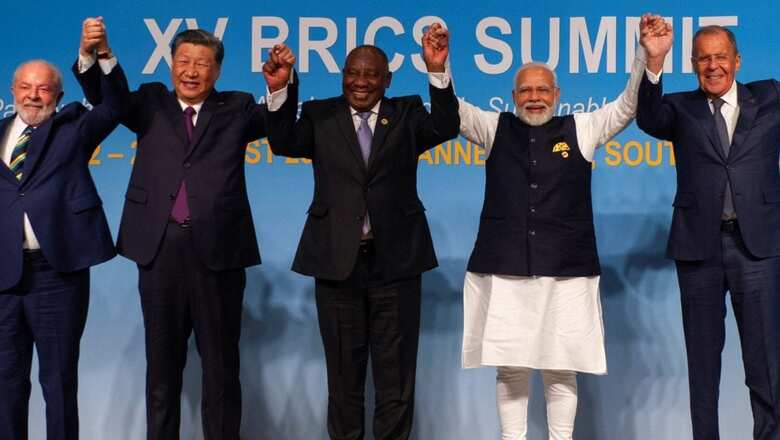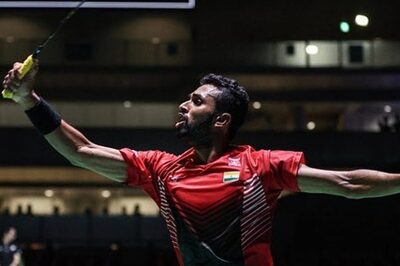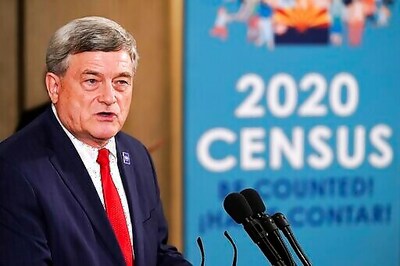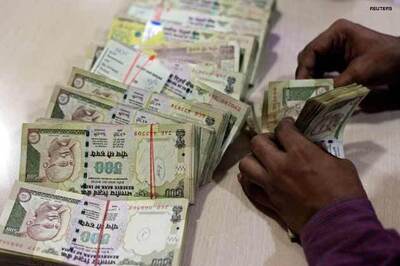
views
As of August 24, 2023, in its 15th summit since the first in 2009, BRICS will not be the same. It is a momentous occasion for the grouping of emerging economies as six new members have been invited to join an expanded BRICS. These include Argentina, Egypt, Ethiopia, Iran, Saudi Arabia and the UAE. This turns the bloc into an overwhelming force with six of the top nine oil-producing countries.
The assault on the petro-dollar cannot be stressed enough. With the new members, BRICS shall now form 37 per cent of the global GDP, up from 31.5 per cent in terms of purchasing power parity, which is much larger than the G7’s 30.7 per cent.
This is a significant breakthrough for BRICS which is now effectively taking an ideological shape, hovering between integrating the voice of the Global South and resisting Western influence through de-dollarisation. BRICS is transitioning from an inert bloc to an assertive economic powerhouse seeking financial and political leverage.
What India Got
India has positioned itself in a sweet spot, maintaining heightened relevance among BRICS nations, while also preparing ground for hosting a G20 summit two weeks later. India’s role in this calculated metamorphosis runs deep as it was the only member initially touted as hesitant about the expansion of this grouping. India’s concerns revolved around how new members, out of the 22 that had expressed interest, would be decided on without allowing reckless political expansion at the hands of China and Russia.
According to sources, it also posed the condition that the BRICS, including new members, should support the United Nations Security Council (UNSC) reforms. It sought unequivocal support for its G20 presidency and its voice of the Global South agenda. It also did not object to the admittance of any of the new entrants, and insisted in particular, for the doors to be opened to the UAE.
And it got what it wanted— the UAE made its way through and the BRICS nations have expressed support for India’s G20 presidency and the voice of the Global South agenda. Most importantly, the BRICS declaration expresses support for UNSC reforms specifying the aspirations of the three countries— Brazil, India and South Africa. This is a significant outcome, as China, which opposes a permanent seat for India at the UNSC, may have diluted its stand amid strained ties with India.
The answer to why China would agree to this may lie in its ambition to expand BRICS and turn it into a launchpad for its own global power play. The visit to Johannesburg is Chinese President Xi Jinping’s second international trip this year, the first being to Moscow to meet Russian President Vladimir Putin. Moreover, as Putin skipped the BRICS summit, speculations about a Modi-Xi meeting were rife as anything otherwise would constitute a loss of face for the Chinese president.
The awkwardness following failed border talks a week prior to the summit is evident even as India seeks Xi’s presence at the G20 summit in New Delhi next month. At the end, there was hardly but one brief interaction between the two leaders where, while walking up to his seat on stage with other BRICS leaders, PM Modi is seen having a brief conversation with President Xi as he walked ahead of the Chinese leader.
Later, India’s foreign secretary Vinay Mohan Kwatra clarified that during that moment, PM Modi raised the longstanding border issue with his Chinese counterpart. The Chinese side, on the other hand, has called this brief exchange a “candid and in-depth conversation” on stabilising bilateral relations. After the Galwan clash in 2020, this is only the second such meeting since the Bali pull-aside last year which was publicised eight months after the event.
What China Got
With India and even Brazil in this medley, BRICS is not outrightly poised to turn into a vehicle for Chinese influence. This does not mean, however, that China has had no luck. Beijing has finally attained an enlarged BRICS forum, positioning it to force its grand geopolitical strategy more effectively. With Saudi Arabia counterbalanced with Iran and Egypt counterbalanced with Ethiopia, analysts may say that BRICS is doomed to be dysfunctional. However, it will not be surprising if these countries exhibit an appetite for setting differences aside when it comes to certain interests such as trading in local currencies and circumventing Western sanctions. After all, none of these nations are fast friends with the White House at the moment.
This is a follow-up to the Iran-Saudi Arabia detente brokered by China. Beijing has also projected itself as a mediator and security provider in the Horn of Africa. There is potential in this equation to elevate China in the image of a masterful peacemaker in regions of conflict, deserted or aggravated by the West. In light of this, the expansion of BRICS is a more-than-decent victory for China, if one considers the long game.
This monumental shift is also beneficial for Russia, which will be hosting next year’s BRICS summit in the city of Kazan. For Putin, who finds himself ostracised owing to the war in Ukraine, this pivotal event may deliver a much-needed impetus to his reputation.
Views expressed in the above piece are personal and solely that of the author. They do not necessarily reflect News18’s views.




















Comments
0 comment